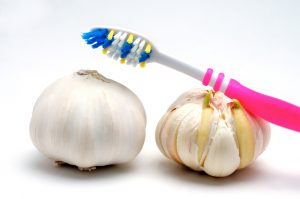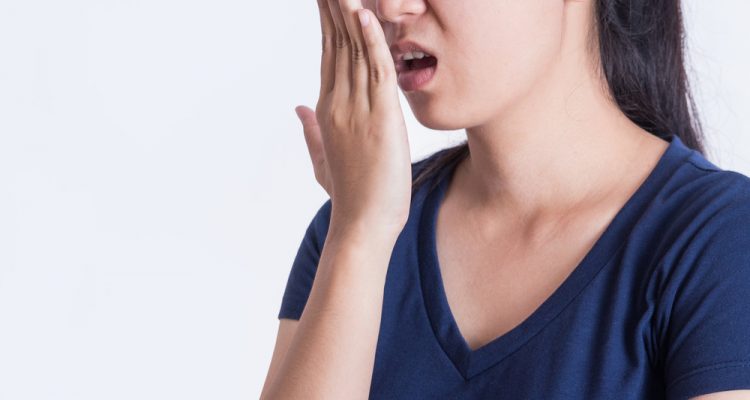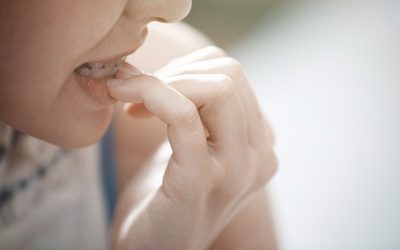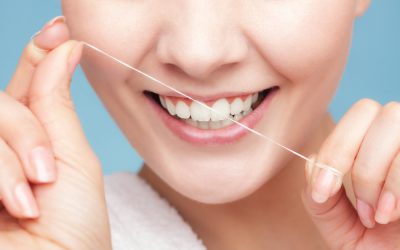 We’ve all done it: huffed a quick breath into a cupped hand and sniffed in deeply to answer the age-old question…..does my breath smell bad?
We’ve all done it: huffed a quick breath into a cupped hand and sniffed in deeply to answer the age-old question…..does my breath smell bad?
Everyone experiences bad breath (halitosis) at some point. Strong foods, coffee and a dry mouth overnight can cause an unpleasant odor or nasty taste in the mouth. But if your find yourself constantly chewing gum, popping mints or gargling mouthwash to cover up bad breath, it’s time to stop using temporary fixes and figure out the root cause of halitosis.
Let’s explore some of the primary factors that cause bad breath and how to resolve them.
7 Reasons Behind Bad Breath
1.) Strong foods and drinks. Foods and drinks with strong flavors – like onion, garlic, coffee, alcohol and spices – leave a distasteful odor in the mouth during the digestion process. Brushing your teeth or chewing gum are temporary fixes, but the risk won’t resolve until the food passes completely from your system.
2.) Plaque buildup. Plaque buildup from poor oral hygiene habits is the most common cause of bad breath. Proper toothbrushing and flossing help remove food particles from your mouth after eating. If you’re not brushing and flossing, food particles remain trapped on the teeth, gums and tongue, which causes bacteria growth and plaque formation. Bacteria and plaque buildup release a nasty mouth odor that won’t go away until your teeth are properly cleaned.
3.) Oral infections. Oral infections like gingivitis, cavities and yeast infections (thrush) can cause mouth odor. Bad breath or a bad taste in the mouth is a warning sign of gingivitis.
4.) Dry mouth. Dry mouth occurs when the oral cavity doesn’t have enough saliva to keep it moist. Saliva is the mouth’s natural cleanser; it removes food particles, debris and dead cells from the teeth, tongue, cheeks and gums. You’ve probably already experienced bad breath from dry mouth – “morning breath” develops when the mouth dries out overnight. Temporary dry mouth can also develop from dehydration or breathing with an open mouth. But chronic dry mouth and persistent bad breath may be a sign of a salivary gland disorder. Dry mouth is also a side effect of many medications.
5.) Poor hardware care. Failing to clean dental hardware like dentures, retainers or mouthguards traps food particles and bacteria on the surface and causes a bad odor.
6.) Smoking. Tobacco-based products like cigarettes and chewing tobacco cause bad breath. Many people who smoke may not realize they have a mouth odor because smoking can affect your sense of smell and taste.
7.) An underlying medical condition. Some medical conditions can cause bad breath. Halitosis may be a sign of a respiratory or sinus infection, acid reflux disease, diabetes, kidney disease or liver disease.
When to Visit Your Dentist
If you have persistent bad breath, then it’s time for a trip to the dentist. Your dentist will perform an examination of your mouth and smell the breath that’s coming from your mouth and nose to determine what’s causing your halitosis.
If you have gum disease, your dentist may order a deep mouth cleaning to wash out infection-causing bacteria. If you have chronic dry mouth, your dentist may prescribe a mouth-lubricating medication or special mouthwash. If your dentist believes halitosis is caused by an underlying medical condition, they’ll refer you to your primary care physician for a medical workup.
If your dentist believes that persistent bad breath is caused by poor oral hygiene habits, they’ll recommend your take the preventative measures listed below.
Preventative Care at Home
In many cases, halitosis is treatable by practicing good oral care. Use the following guidelines to get your oral health back on track and banish bad breath.
- Brush and floss every single day. Brush your teeth twice a day for 2 minutes each and floss once a day. Keep a spare toothbrush on hand when you’re out to brush your teeth between meals. If you can’t brush between meals, then rinse your mouth out with water to remove lingering food particles and debris.
- Brush your tongue. Many people neglect brushing the tongue, but it’s a prime location for bacteria and debris buildup. Clean the entire length of your tongue every time you brush your teeth.
- Use mouthwash. Swish a fluoridated mouthwash around once a day. You can also use an antiseptic mouthwash, which kills mouth bacteria. Mouthwash provides another layer of protection against tooth decay and gum disease.
- Replace your toothbrush regularly. Replace your toothbrush every 2-3 months, or sooner if the bristles look frayed or worn. A worn-down toothbrush isn’t as effective at removing plaque from your mouth.
- Clean your dental hardware every day. Scrub your dentures, retainer or mouthguard before and after every use, and store your hardware in a clean, dry case between uses.
- Stop smoking. If you smoke, take measures to quit now. Not only will quitting get rid of bad breath, but it reduces your risk of gum disease, oral cancer and other serious medical conditions.
- Stay hydrated. Drink plenty of water during the day to keep your mouth moist and prevent temporary dry mouth.
- Watch your diet. Eat strong-flavored foods and spices in moderation. And cut down on beverages that dry out your mouth and reduce saliva flow, like coffee and alcohol. To increase the amount of saliva in your mouth, munch on crunchy, fibrous snacks like apples, celery and carrots.
Along with all the care steps listed above, one of the best ways you can prevent halitosis and keep your mouth healthy is to visit your dentist regularly for cleanings and checkups. Dr. Boyett and her team of caring dental hygienists are here to serve you – contact us today to schedule your next appointment!






